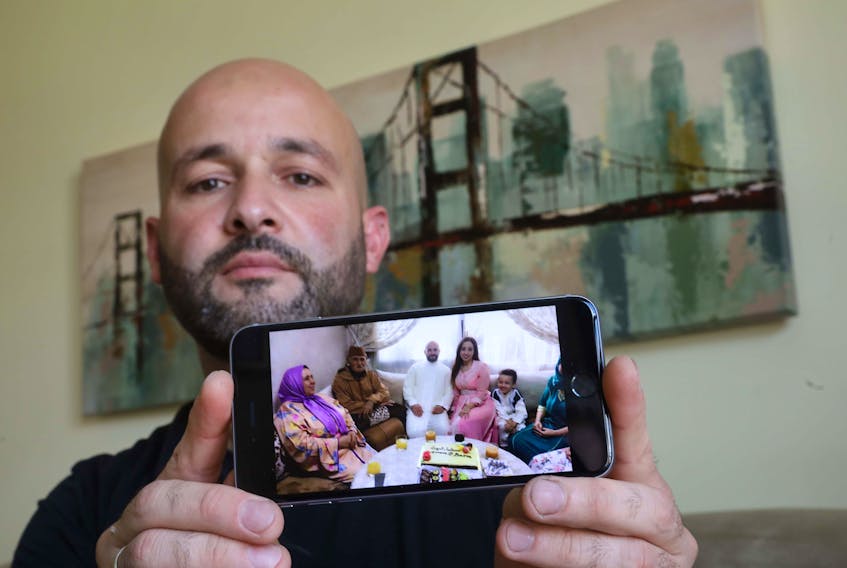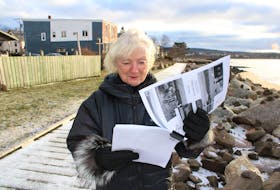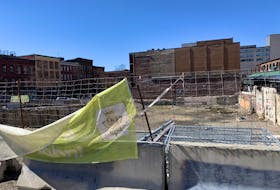A year and four months.
That’s how long Baris Bayraktar has waited since he submitted a spousal sponsorship application in order to bring his wife Imane Boussag to Halifax.
According to Immigration, Refugees and Citizenship Canada, sponsoring a spouse or partner is expected to take 12 months. That’s how long Bayraktar was prepared to wait.
Since COVID-19 hit, he’s faced the prospect of not seeing his wife again — who he last saw in March when he visited her in Morocco — indefinitely.
“I can no longer tell her it’s going to be this much time. At least before, when she said ‘I miss you,’ I would say, ‘Don’t worry, it’s going to be three months, two months, another two months it’s going to be finished,’” said Bayraktar, who moved to Canada from Turkey in 1989 and is a Canadian citizen.
“It’s really difficult. It’s something we live with everyday.”
Thousands separated
Bayraktar said he thought he was alone in his spousal sponsorship struggle, but learned there are thousands of others in Canada who have also been separated from their loved ones and are waiting for their family sponsorship applications to be processed amid the pandemic.
More than 3,000 people have signed a petition calling on the Minister of Immigration, Refugees and Citizenship Canada, Marco Mendicino, to offer accommodations to “accelerate” the reunification of families with spousal sponsorship applications.
They are asking for the creation of a special temporary resident visa for outland applicants, specific completion timeline targets for applications in process for 12 months or more, and for the government to allow spouses and children to visit Canada for the purpose of reunification during the sponsorship process, among other accommodations.
“What I’m hoping for is the government to implement something to bring clarity to these files,” said Bayraktar.
“(The government is) prioritizing international students as soon as the border opens up and I find that really baffling that us citizens, who are given a timeline to bring our spouses or significant others here, are not being prioritized when there’s thousands of us making pleas and sending letters to our MPs and there’s not a word mentioned about it.”
‘It’s really stressful’
Since Bayraktar and his wife met in 2018, he said he has been “back and forth” to Morocco because he can’t bear to be apart from the love of his life for long periods at a time.
Seeing how his spousal application is currently up in the air, he said he plans to visit Morocco again in September, if travel restrictions are lifted by then.
“It’s financially straining and it’s mentally straining,” he said.

Once reunited with his wife in Nova Scotia, Bayraktar said he wants to show her around the province and take her on a trip to Montreal. The two plan to move into a house in Halifax together and start a family.
Until then, he said the two are trying to keep in touch regularly, phoning each other a few times a day to keep their long-distance relationship going.
“You want to be next to your significant other, but all you can do is live your married life through a telephone or WhatsApp video conference. We really don’t know what to do anymore. It’s really stressful,” he said.
“Without her, I feel like my life is only half complete.”
Government searching for ways to reunite families
The Chronicle Herald requested an interview with a representative from Immigration, Refugees and Citizenship Canada, but it was declined.
Instead, in an email statement, IRCC spokesperson Nancy Caron acknowledged that the pandemic has presented a “difficult time for families and others who are making their way through the immigration system.”
Caron noted IRCC continues to accept and process applications throughout the pandemic, including family sponsorship applications, “notwithstanding that our operational capacity remains at a limited capacity both domestically and abroad.”
To minimize the disruption caused by COVID-19, the government has assured sponsors and applicants that no application will be closed or refused due to a lack of documentation or an inability to complete the application process under the normal timelines, she added.
“We will continue to search for innovative and compassionate ways to reunite families, while always being informed by the advice of our public health experts, who remind us that COVID-19 is still very much a risk to the health and safety of Canadians,” said Caron.









